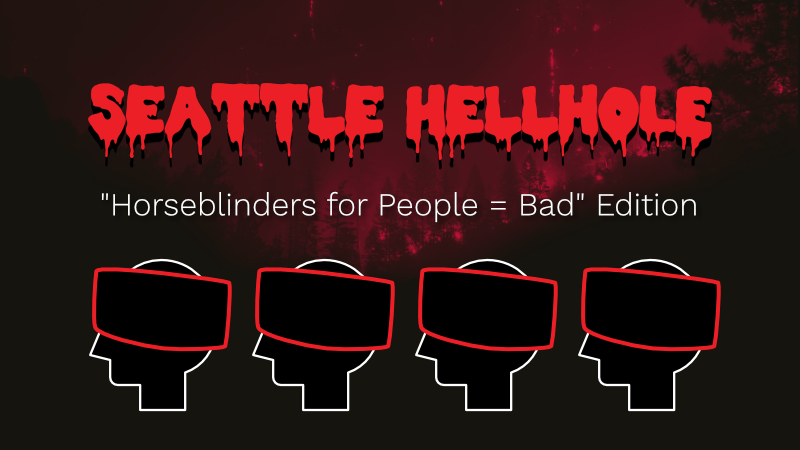In this week’s Hellhole: cash bail is bad, our regressive tax structure threatens workers, Mayor Durkan rewards bad deeds, and workers deserve better than McMansions in Laurelhurst! Enter the Hellhole…
Why Does Seattle Still Have Cash Bail?
In 2013, Seattle funded a study that found:
“60 percent of inmates across the country are being held in detention while their cases move through the court system. In Seattle, research from an SMC study showed that 31 percent of individuals in custody who were charged with misdemeanors in 2014 remained in jail while waiting for their next court date because they were unable to come up with cash for bail.”
Long-term jail time, especially for misdemeanors, has the serious potential to destroy lives. People stuck because they lack the money to get out can potentially lose jobs, face eviction, and have their outside lives completely and permanently screwed over.
This week Councilmember Bagshaw blamed the very presence of the jail for exacerbating homelessness in the city, while failing to ask why so many people coming out of jail A) have no place to go and B) have no support when they’re coming out.
That freedom requires money at all is absurd, when seventy percent of people in jail haven’t been convicted of a crime.
It’s time Seattle
- Eliminate cash bail
- Eliminate the criminalization of poverty
- Tax the rich. We live in a county with the two richest people in the world, surrounded by giant international corporate headquarters, they should pay their fair share
Cash bail is an unjust system that ruins lives for the crime of low liquidity. It has no place in a our society.
Speaking of Taxing the Rich . . .
Washington’s dysfunctional tax code keeps poor people poor and rich people rich — it’s the most regressive in the U.S.. According to a study by the Institute on Taxation and Economic Policy, Washingtonians with the lowest incomes pay six times more in taxes as a percent of their income than the state’s wealthiest residents. The system is punative.
As the Washington State Budget and Policy Center writes, “those earning less than $24,000 per year pay about 17.8 percent of their incomes in state and local taxes, while households earning more than $546,000 per year (the top 1 percent) pay only 3 percent.” They propose two fixes: taxing capital gains and expanding the Working Families Tax Rebate, which would refund part of the sale taxes paid by the poor.
Washington needs what Marx called “a heavy progressive or graduated income tax.” Additionally, we need to ensure that taxes on capital gains—profit from the sale of property or investments—aren’t taxed a lower rate as they are at the federal level. Unfortunately, in 2010 a modest income tax on the rich was defeated in part by big spending by Jeff Bezos and Paul Allen.
Washington remains in the esteemed company of states like Texas without this critical means of improving our world. A progressive state income tax: Washington, you have nothing to lose but your classist tax system.
C.O.P.S.
Durkan made a deal with the Seattle Police. Despite recent abuses, one of the highest paid departments in the country won:
- Over a 10% raise (including 3% retroactive raises for 2015-2017)
- A reversal of publicly-demanded accountability reforms
- The practical return of a 180-day time limit for investigating officer misconduct.
- Voluntary body cameras — with an additional 2% pay increase for those that use them
The Seattle Police Department remains one of the largest line items in the budget, with a cost many times larger than that of Health & Human Services. Durkan’s contract is a sweetheart deal that demonstrates who she sides with. The Police Department gets to avoid accountability and will be paid handsomely to do it.
When asked if she anticipated any issue with getting approval, Durkan answered, “no.”
No bad deed goes unrewarded.
We Deserve Better than Laurelhurst McMansions
Seattle neighborhoods like Laurelhurst, the second richest in Seattle, bestow a genteel respectability to segregation. In a city that’s broadly 34.3% people of color, Laurelhurst is only 13.4%. It’s the result of decades of neighborhood racial covenants, systematic blocking of people of color through redlining, and exacerbated economic inequality.
A plan for development at a site formerly known as the Talaris Conference Center in Laurelhurst calls for 60 luxury homes (expensive enough to warrant a $16,000 monthly mortgage payment). It’s more luxury in a city that’s drowning in it, where high rent is driving people into the street. Did we mention there’s a public comment period?
Unlike the Fort Lawton public land hearings in Magnolia, Talaris is a private developement and public input is relegated to a secondary roll. Additionally, the development won’t be part of the Mandatory Housing Affordability scheme—which at the very least contributes funding for affordable housing. It’s close the University. It’s a prime candidate for high-density, affordable, housing for all. But instead, it’s another fancy thing for rich folks.
Housing is a right, not an asset. No single owners, no corporations, no landlords.
Let them know we want housing for all in Laurelhurst, not McMansions for the rich!
Send all alternatives, demands, and curse words by October 24 to [email protected] and be sure to note Master Permit 3030811.
Note: The Seattle Hellhole represents the views of its writers and are not official positions of Seattle DSA at large. Its writers are a collective working on independent pieces, editing, and design to deliver this each week. If you want to volunteer, join us in #communications on Slack or email [email protected]
